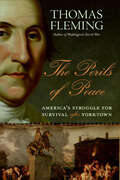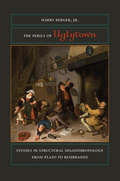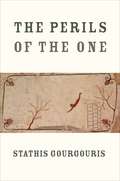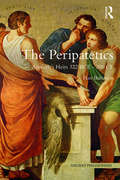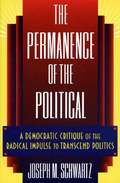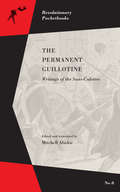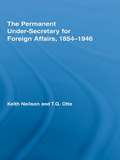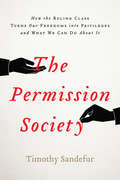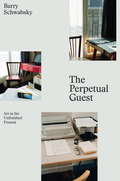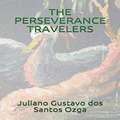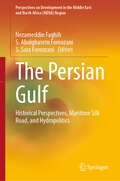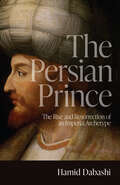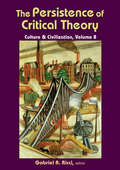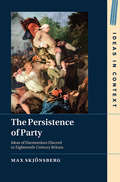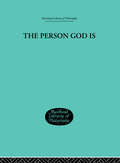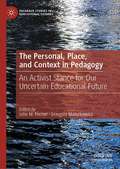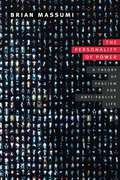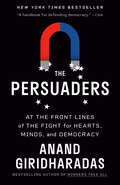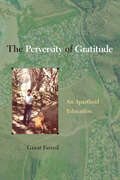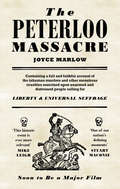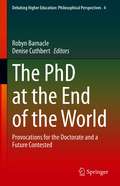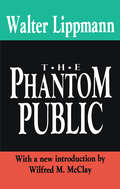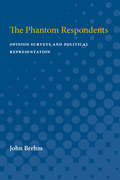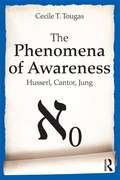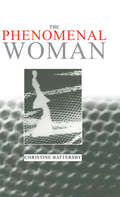- Table View
- List View
The Perils of Peace: America's Struggle for Survival After Yorktown
by Thomas FlemingThe acclaimed historian presents a “captivating account of a surprisingly little-known period” at the close of the American Revolution (Kirkus, starred review).On October 19, 1781, Great Britain’s best army surrendered to General George Washington at Yorktown. But the future of the thirteen former colonies was far from clear. 13,000 British troops still occupied New York City, and another 13,000 regulars and armed loyalists were scattered from Canada to Georgia. Meanwhile, the American army had not been paid for years and was on the brink of mutiny.In Europe, America’s only ally, France, teetered on the verge of bankruptcy and was soon reeling from a disastrous naval defeat in the Caribbean. A stubborn George III dismissed Yorktown as a minor defeat and refused to yield an acre of “my dominions” in America. In Paris, Ambassador Benjamin Franklin confronted violent hostility toward France among his fellow members of the American peace delegation.In The Perils of Peace, Thomas Fleming moves between the key players in this drama and shows that the outcome we take for granted was far from certain. With fresh research and masterful storytelling, Fleming breathes new life into this tumultuous but little known period in America’s history.
The Perils of Uglytown: Studies in Structural Misanthropology from Plato to Rembrandt
by Harry BergerWith characteristic wit, Harry Berger, Jr., brings his flair for close reading to texts and images across two millennia that illustrate what he calls “structural misanthropology.” Beginning with a novel reading of Plato, Berger emphasizes Socrates’s self-acknowledged failures. The dialogues, he shows, offer up, only to dispute, a misanthropic polis. The Athenian city-state, they worry, is founded on a social order motivated by apprehension—both the desire to take and the fear of being taken. In addition to suggesting new politicaland philosophical dimensions to Platonic thought, Berger’s attention to rhetorical practice offers novel ways of parsing the dialogic method itself. In the book’s second half, Berger revisits and revises his earlier accounts of Italian humanism, Elizabethan drama, and Dutch painting. Berger shows how structural misanthropology helps us to read the competitive practices that characterize Renaissance writing and art, whether in Machiavelli’s constitutional prostheses, Shakespeare’s pageants of humiliation, or the elbow jabs of Dutch portraiture.
The Perils of the One
by Stathis GourgourisFrom the earliest times, societies have been seduced by the temptation of unitary thinking. Recognizing the vulnerability of existence, people and cultures privilege regimes that confer authority on a single entity, a sovereign ruler, a transcendental deity, or an Event, which they embrace with unquestioned devotion. Such obsessions precipitate contempt for the worldliness of real bodies in real time and refusal of responsibility and agency.In The Perils of the One, Stathis Gourgouris offers a philosophical anthropology that confronts the legacy of “monarchical thinking”: the desire to subjugate oneself to unitary principles and structures, whether political, moral, theological, or secular. In wide-ranging essays that are at once poetic and polemical, intellectual and passionate, Gourgouris reads across politics and theology, literary and art criticism, psychoanalysis and feminism in a critique of both political theology and the metaphysics of secularism. He engages with a range of figures from the Apostle Paul and Trinitarian theologians, to La Boétie, Schmitt, and Freud, to contemporary thinkers such as Clastres, Said, Castoriadis, Žižek, Butler, and Irigaray. At once a broad perspective on human history and a detailed examination of our present moment, The Perils of the One offers glimpses of what a counterpolitics of autonomy would look like from anarchic subjectivities that refuse external ideals, resist the allure of command and obedience, and embrace otherness.
The Peripatetics: Aristotle's Heirs 322 BCE - 200 CE (Ancient Philosophies)
by Han BaltussenThe Peripatetics explores the development of Peripatetic thought from Theophrastus and Strato to the work of the commentator Alexander of Aphrodisias. The book examines whether the internal dynamics of this philosophical school allowed for a unity of Peripatetic thought, or whether there was a fundamental tension between philosophical creativity and the notions of core teachings and canonisation. The book discusses the major philosophical preoccupations of the Peripatetics, interactions with Hellenistic schools of thought, and the shift in focus among Greek philosophers in a changing political landscape. It is the first book of its kind to provide a survey of this important philosophical tradition.
The Permanence of the Political: A Democratic Critique of the Radical Impulse to Transcend Politics
by Joseph M. SchwartzWhy have radical political theorists, whose thinking inspired mass movements for democracy, been so suspicious of political plurality? According to Joseph Schwartz, their doubts were involved with an effort to transcend politics. Mistakenly equating all social difference with the harmful way in which particular interests dominated marketplace societies, radical thinkers sought a comprehensive set of "true human interests" that would completely abolish political strife. In extensive analyses of Rousseau, Hegel, Marx, Lenin, and Arendt, Schwartz seeks to mediate the radical critique of democratic capitalist societies with the concern for pluralism evidenced in both liberal and postmodern thought. He thus escapes the authoritarian potential of the radical position, while appropriating its more democratic implications.In Schwartz's view, a reconstructed radical democratic theory of politics must sustain liberalism's defense of individual rights and social pluralism, while redressing the liberal failure to question structural inequalities. In proposing such a theory, he criticizes communitarianism for its premodern longing for a monolithic, virtuous society, and challenges the "politics of difference" for its failure to question the undemocratic terrain of power on which "difference" is constructed. In conclusion, he maintains that an equitable distribution of power and resources among social groups necessitates not the transcendence of politics but its democratic expansion.
The Permanent Guillotine: Writings of the Sans-Culottes (Revolutionary Pocketbooks)
by Mitchell AbidorWhen the Bastille was stormed on July 14, 1789, it wasn't a crowd of breeches-wearing professionals that attacked the prison, it was the working people of Paris. The Permanent Guillotine is an anthology of figures who expressed the will and wishes of this nascent revolutionary class, in all its rage, directness, and contradictoriness.
The Permanent Under-Secretary for Foreign Affairs, 1854-1946 (British Politics and Society)
by Keith Neilson T.G. OtteChief among the personnel at the Foreign Office is the Permanent Under-secretary, the senior civil servant who oversees the department and advises the Foreign Secretary. This book is a study of the twelve men who held this Office from 1854–1946.
The Permission Society: How the Ruling Class Turns Our Freedoms into Privileges and What We Can Do About It
by Timothy SandefurThroughout history, kings and emperors have promised "freedoms" to their people. Yet these freedoms were really only permissions handed down from on high. The American Revolution inaugurated a new vision: people have basic rights to life, liberty, and the pursuit of happiness, and government must ask permission from them. Sadly, today's increasingly bureaucratic society is beginning to turn back the clock and to transform America into a nation where our freedoms-the right to speak freely, to earn a living, to own a gun, to use private property, even the right to take medicine to save one's own life-are again treated as privileges the government may grant or withhold at will. Timothy Sandefur examines the history of the distinction between rights and privileges that played such an important role in the American experiment, and how we can fight to retain our freedoms against the growing power of government. Illustrated with dozens of real-life examples-including many cases he litigated himself-Sandefur shows how treating freedoms as government-created privileges undermines our Constitution and betrays the basic principles of human dignity.
The Perpetual Guest
by Barry SchwabskyLeading art critic explores the connections between art's past and presentThe idea of contemporary art sometimes allows us to pretend we have made a clean break with the past. In The Perpetual Guest, poet and critic Barry Schwabsky demonstrates that any robust understanding of art's present must also account for the ongoing life and changing fortunes of its past.In surveying the art world of this past decade, Schwabsky attends not only to its most significant newer faces--among them, Kara Walker, Thomas Hirschhorn, Ai Weiwei, Chris Ofili, and Lorna Simpson--but their forebears, both recent (Jeff Wall, Nancy Spero, Dan Graham, Cindy Sherman) and more distant (Velázquez, Manet, Matisse, and the portraitists of the Renaissance)."The art critic," Schwabsky writes, "formalizes and deliberately exemplifes the role of the spectator who realizes the artist's work, not by leaving it just as it is, but by adding something to it, making a personal contribution."Despite the hysterical pronouncements of criticism's demise, Schwabsky's rich and subtle considerations of art's complexly intertwined traditions are an indispensable contribution to understanding our present moment.From the Trade Paperback edition.
The Perseverance Travelers
by Juliano OzgaThe Birth Of The “Fire Salamander” (0-7 Years) The Turbulent Childhood Of Young Alf Naftali Kalil (8-14 Years) The Way To The Fire Work: Becoming a Manual Glass Master's Apprentice (15-21 Years) The Beginning Of Men's Trial And The Schooling Away From Home: Manual Glass Master (22-28 Years) The Practical Work Of Fire: The Marriage With Teresa Paula Isadora (29-35 Years) The Fire Salamander's Daughter: Augusta Rebeca Jade (36-42 Years) The Fight Against Adversity: Raising a Daughter (43-49 Years) The End Of The Hard Work To Survive (50-56 Years) The Beginning Of The Journey Of Perseverance Travelers (57-63 Years) The Water Initiation (64-70 Years) The Earth Initiation (71-77 Years) The Air Initiation (78-84 Years)
The Persian Gulf: Historical Perspectives, Maritime Silk Road, and Hydropolitics (Perspectives on Development in the Middle East and North Africa (MENA) Region)
by Nezameddin Faghih S. Abolghasem Foroozani S. Sara ForoozaniThis edited volume provides a comprehensive exploration of the Persian Gulf, covering historical naming and trade relationships, political and military strategies, and the impact of tribal systems on regional security. It spans from the Sassanid period to modern times, examining the role of the Maritime Silk Road and the strategic importance of water resources. Through contributions from various experts, the book offers a multi-dimensional view of the Persian Gulf, making it an essential resource for scholars and students interested in the region's complex dynamics.
The Persian Prince: The Rise and Resurrection of an Imperial Archetype
by Hamid DabashiWith its title borrowed from Machiavelli, The Persian Prince goes far beyond Machiavelli's wildest imagination as to how to rule the world. Hamid Dabashi articulates a bold new idea of the Persian Prince—a metaphor of political authority, a figurative ideal deeply rooted in the collective memories of multiple nations, and a literary construct that connected Muslim empires across time and space and continues to inform political debate today. Drawing on works from Classical Antiquity and the vast Persianate worlds from India to the Mediterranean, as well as the Hebrew Bible and European medieval mirrors for princes, Dabashi engages a diverse body of political thought to reveal the construction of the Persian Prince as a potent archetype. He traces this archetype through its varied historic gestations and finds it resurfacing in postcolonial political thought as a rebel, a prophet, a poet, and a nomad. Bringing poetics and politics together, Dabashi shows how this archetypal figure has long defined political authority throughout the wider Iranian and Islamic worlds. With meticulous attention to literary and poetic texts, moral and philosophical treatises, allegorical and anecdotal stories, sacred and secular evidence, visual and performing arts, histories of global empires and colonial conquests, this sweeping work offers a deeply learned, richly erudite, and transformative piece of critical thinking. As Dabashi shows, the Persian Prince remains the stuff of current debate across the Muslim and Persianate worlds, in contestations over the public domain and the collective will to power, and above all in the prospects of democratic institutions.
The Persistence of Critical Theory: Culture And Civilization (Culture and Civilization)
by Gabriel R. RicciThe latest volume of Culture and Civilization gathers contemporary exponents of critical theory, specifically those based in the Frankfurt School of social thinking. Collectively, this volume demonstrates the continuing intellectual viability of critical theory, which challenges the limits of positivism and materialism. We may question how the theoretical framework of Marxism fails to coordinate with the conditions that defined labor forces, as did Max Horkheimer and Theodor Adorno, or deliberate on the conditions that justify the claims we make through public discourse, as did Jurgen Habermas. Or, like Axel Honneth, we may reflect on recognition theory as a means of addressing social problems. Whatever our objective, the focus of critical theory continues to be the consciousness of established "positive" interests that, without debate, may sustain injustices or conditions which the public may not have chosen to impose. Throughout the hardship of punitive dismissal and exile in the 1930s and 40s, and the shock of the New Left in the 1960s and 70s, and finally the later linguistic and pragmatic turn, the Frankfurt School has sustained the idea that people escape disaffection and alienation when their knowledge of the social and political world is dialectically mediated through creative interaction. This new volume in the Culture and Civilization series continues the tradition of critical thought.
The Persistence of Party: Ideas of Harmonious Discord in Eighteenth-Century Britain (Ideas in Context)
by Max SkjönsbergPolitical parties are taken for granted today, but how was the idea of party viewed in the eighteenth century, when core components of modern, representative politics were trialled? From Bolingbroke to Burke, political thinkers regarded party as a fundamental concept of politics, especially in the parliamentary system of Great Britain. The paradox of party was best formulated by David Hume: while parties often threatened the total dissolution of the government, they were also the source of life and vigour in modern politics. In the eighteenth century, party was usually understood as a set of flexible and evolving principles, associated with names and traditions, which categorised and managed political actors, voters, and commentators. Max Skjönsberg thus demonstrates that the idea of party as ideological unity is not purely a nineteenth- or twentieth-century phenomenon but can be traced to the eighteenth century.
The Person God Is
by Bertocci, Peter AFirst published in 2002. Routledge is an imprint of Taylor & Francis, an informa company.
The Personal, Place, and Context in Pedagogy: An Activist Stance for Our Uncertain Educational Future (Palgrave Studies in Educational Futures)
by Grzegorz Mazurkiewicz John M. FischerThis edited volume includes contributions on education within a world of challenges by authors with diverse experiences and perspectives. Together, the authors reflect on educational initiatives and life in democratic societies, arguing for an increased awareness of the educational processes at work within our contexts, places, and personal lives. Chapters argue that authority and knowledge belong to everyone and that these are found on every level of perceived educational hierarchies. This book calls for attention to be paid to the voices of teachers in school, students in the classroom, participants in a project, and researchers embedded in a community—highlighting that they all have something to teach about understanding the world all are working to create in an uncertain educational future.
The Personality of Power: A Theory of Fascism for Anti-fascist Life (Thought in the Act)
by Brian Massumi“I am the Chosen One!” With this exclamation Donald Trump crowns the national exceptionalism his base upholds with a claim of personal exceptionalism. He leaves no doubt as to the emotional note: “I am your vengeance!” He personifies reaction for the masses. Except, in today’s microsegmented social media environment the “masses” no longer exist. Fascism’s cultural conditions have shifted. In The Personality of Power, Brian Massumi retheorizes the conditions of contemporary fascism through the prism of Trump’s persona. Older theories based on identification of the masses with a charismatic leader no longer hold. Rather, an affective regime of reaction agitates bodies and orients lives at the molecular level. Massumi examines this agitation in relation to race, gender, personhood, and conspiracy thinking. The Personality of Power is a political treatise on fascism and its precursor movements, coupled with a philosophical inquiry into becoming reactionary as a collective process. Massumi calls the very concept of the person into question, asking what collective personhood means concretely. Nothing less than an alternative political logic is needed, turned to the task of thinking collective individuation.
The Persuaders: At the Front Lines of the Fight for Hearts, Minds, and Democracy
by Anand GiridharadasNEW YORK TIMES BESTSELLER • An insider account of activists, politicians, educators, and everyday citizens working to change minds, bridge divisions, and fight for democracy—from disinformation fighters to a leader of Black Lives Matter to Bernie Sanders and Alexandria Ocasio-Cortez and more—by the best-selling author of Winners Take All and award-winning former New York Times columnist&“Anand Giridharadas shows the way we get real progressive change in America—by refusing to write others off, building more welcoming movements, and rededicating ourselves to the work of changing minds.&” —Robert B. Reich, best-selling author of The SystemThe lifeblood of any free society is persuasion: changing other people&’s minds in order to change things. But America is suffering a crisis of faith in persuasion that is putting its democracy and the planet itself at risk. Americans increasingly write one another off instead of seeking to win one another over. Debates are framed in moralistic terms, with enemies battling the righteous. Movements for justice build barriers to entry, instead of on-ramps. Political parties focus on mobilizing the faithful rather than wooing the skeptical. And leaders who seek to forge coalitions are labeled sellouts.In The Persuaders, Anand Giridharadas takes us inside these movements and battles, seeking out the dissenters who continue to champion persuasion in an age of polarization. We meet a leader of Black Lives Matter; a trailblazer in the feminist resistance to Trumpism; white parents at a seminar on raising adopted children of color; Bernie Sanders and Alexandria Ocasio-Cortez; a team of door knockers with an uncanny formula for changing minds on immigration; an ex-cult member turned QAnon deprogrammer; and, hovering menacingly offstage, Russian operatives clandestinely stoking Americans&’ fatalism about one another.As the book&’s subjects grapple with how to call out threats and injustices while calling in those who don&’t agree with them but just might one day, they point a way to healing, and changing, a fracturing country.
The Perversity of Gratitude: An Apartheid Education
by Grant FarredApartheid, ironically, provided Grant Farred with the optimal conditions for thinking. He describes South Africa’s apartheid regime as an intellectual force that, “Made thinking apartheid, more than anything else, an absolute necessity.” The Perversity of Gratitude is a provocative book in which Farred reflects on an upbringing resisting apartheid. Although he is still inclined to struggle viscerally against apartheid, he acknowledges, “It is me.” Unsentimental about his education, Farred’s critique recognizes the impact of four exceptional teachers—all engaging pedagogical figures who cultivated a great sense of possibility in how thinking could be learned through a disenfranchised South African education. The Perversity of Gratitude brings to bear the work of influential philosophers such as Martin Heidegger and Jacques Derrida. The book tackles broad philosophical concepts—transgression, withdrawal, and the dialectic. This leads to the creation of a new concept, “the diaspora-in-place,” which Farred explains, “is having left a place before one physically removes oneself from this place.” Farred’s apartheid education in South Africa instilled in him a lifelong commitment to learning thinking. “And for that I am grateful,” Farred writes in The Perversity of Gratitude. His autopoiesis is sure to provoke and inspire readers.
The Peterloo Massacre
by The Estate Marlow***The subject of the new major film by Mike Leigh***Unity of the oppressed can make a difference in politically uncertain times A peaceful protest turned tragedy; this is the true story of the working class fight for the vote.On August 16 1819, in St Peter’s Field, Manchester, a large non-violent gathering demanding parliamentary reform turned into a massacre, leaving many dead and hundreds more injured.This catastrophic event was one of the key moments of the age, a political awakening of the working class, and eventually led to ordinary people gaining suffrage. In this definitive account Joyce Marlow tells the stories of the real people involved and brings to life the atrocity the government attempted to cover up. The Peterloo Massacre is soon to be the subject of a major film directed by Mike Leigh.
The PhD at the End of the World: Provocations for the Doctorate and a Future Contested (Debating Higher Education: Philosophical Perspectives #4)
by Denise Cuthbert Robyn BarnacleThis book addresses a world-wide audience with reference to a global problem: how the PhD can serve the planet. It examines the role of the PhD, in and of itself, and, as representative of research, the university and evidence-based knowledge, in relation to global crisis and the future of humanity. As such, it speaks to the scholar, the teacher, the policy-maker and the administrator concerned with the role of higher education’s highest award at a time of great global crisis. The approach is critical in that it offers diverse views on these issues and does not seek to privilege one single school of thought. The collected articles span theoretical reflections on key issues through to case-study examples of how PhDs are being deployed and re-thought to address global issues.
The Phantom Public
by Walter LippmannIn an era disgusted with politicians and the various instruments of "direct democracy," Walter Lippmann's The Phantom Public remains as relevant as ever. It reveals Lippmann at a time when he was most critical of the ills of American democracy. Antipopulist in sentiment, this volume defends elitism as a serious and distinctive intellectual option, one with considerable precursors in the American past. Lippmann's demythologized view of the American system of government resonates today.The Phantom Public discusses the "disenchanted man" who has become disillusioned not only with democracy, but also with reform. According to Lippmann, the average voter is incapable of governance; what is called the public is merely a "phantom." In terms of policy-making, the distinction should not be experts versus amateurs, but insiders versus outsiders. Lippmann challenges the core assumption of Progressive politics as well as any theory that pretends to leave political decision making in the hands of the people as a whole.In his biography Walter Lippmann and the American Century, Ronald Steel praised The Phantom Public as "one of Lippmann's most powerfully argued and revealing books. In it he came fully to terms with the inadequacy of traditional democratic theory." This volume is part of a continuing series on the major works of Walter Lippmann. As more and more Americans are inclined to become apathetic to the political system, this classic will be essential reading for students, teachers, and researchers of political science and history.
The Phantom Respondents
by John BrehmExamines a fundamental problem for opinion polls and those who use them.
The Phenomena of Awareness: Husserl, Cantor, Jung
by Cecile TougasWhat is awareness? How is dreaming different from ordinary awareness? What does mathematics have to do with awareness? Are different kinds of awareness related? “Awareness” is commonly spoken of as “mind, soul, spirit, consciousness, the unconscious, psyche, imagination, self, and other.” The Phenomena of Awareness is a study of awareness as it is directly experienced. From the start, Cecile T. Tougas engages the reader in reflective notice of awareness as it appears from moment to moment in a variety of ways. The book draws us in and asks us to focus on the flow of phenomena in living experience, not as a theoretical construct, nor an image, nor a biochemical product, but instead as phases, moments, or parts that cannot exist without one another. Tougas shows how these parts exist in mutual dependence as a continuum of awareness, as the flow of lived time, and how noticing time deepens psychological self-understanding and understanding of another. The Phenomena of Awareness is divided into four parts: • Seeking and Noticing Awareness• Observing and Understanding the Flow of Phenomena• Distinguishing Intentional Acts• Work in Progress Drawing on the work of E. Husserl, G. Cantor and C.G. Jung, this book is an original synthesis of phenomenology, mathematics and psychology that explores awareness and the concept of ‘transfinite number’. This book will be of interest to analytical psychologists, philosophers, mathematicians, feminist scholars, humanities teachers and students. Cecile T. Tougas teaches Latin at the North Carolina School of Science and Mathematics, Durham. She taught philosophy at the University of Southern Maine and the University of Massachusetts Lowell.
The Phenomenal Woman: Feminist Metaphysics and the Patterns of Identity
by Christine BattersbyThis original book enters the undeveloped territory of feminist metaphysics and offers a bold and unusual contribution to debates about identity, essence and self. Using a diverse range of theories - from Kant to chaos theory, from Kierkegaard to Deleuze, Irigaray, Butler and Oliver Sachs - this book challenges the assumption that metaphysics can remain unchanged by issues of sexual difference.
